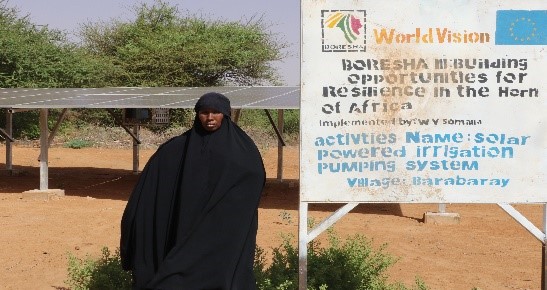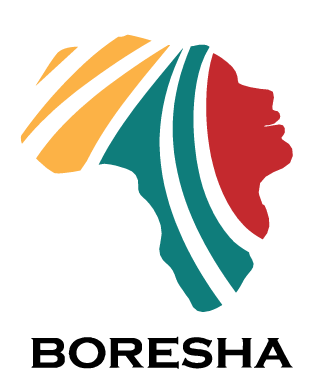Norto Garane, a 58-year old mother, is a resident of Barabarai Village in Dollow district, Somalia. She is a member of the community Disaster Risk Reduction Committee. She lost her husband years ago, which left her alone with the the responsibility of taking care of her large family of 14. For the longest time, Norto’s main source of income was livestock keeping but due to climate change she has diversified and incorporated crop farming into her livelihood activities.

Photo1: Norto standing at the irrigation source point. |

Photo2: Onion and squash being cultivated at her plot |
After the prolonged drought and dry spell that Somalia has suffered, with five consecutive seasons of rainfall failure, the burden of keeping her livestock alive has taken a heavy toll. Norto had 25 cows, but because of the drought, she now has only 6 left. “As pasture and grass became scarce and then non-existent, to keep our animals alive, we were forced to buy the feed from the market, which was very costly,” Norto says.
She always had dreams of expanding her farm in order to make it more profitable, but those dreams were dashed given the current drought, which left Norto and her family vulnerable. This is how she came to be selected as one of the participants of World Vision’s irrigation farming support under the BORESHA project. Farmers were assisted with the installation of solar panels and tapping of water from the nearby river to support them undertake irrigation farming. This support was intended to help increase their crop’s productivity and reduce the need for costly diesel fuel to power generators, thus also benefiting the ennvironment.
Some few months after the installation of the solar powered water pump, Norto doubled the area under cultivation from less than half hectare to one hectare, where she now grows a variety of crops, including coriander, tomato, spinach, maize, soya beans, onions, papaya, and bananas. Norto says that her income has gone up and that the quality of produce harvested has improved.
“Two months ago, I harvested tomatoes from this plot, and I earned US$800 from 67 plastic drums each worth US$12” she says.
The BORESHA project targets female headed households as a priority. Besides boosting their income, it has helped improve food production and nutrition by increasing the amount of healthy food for home consumption. Now for most of the year, beneficiary farmers have vegetables and fruits under cultivation, now greatly more abundant thanks to the water sourced from the river.
“I would say life has improved significantly for me and my family, thanks to the support of these solar panels. I feel more fulfilled and encouraged even as I hope to expand the farm in the future so that I can keep increasing our yields.”
